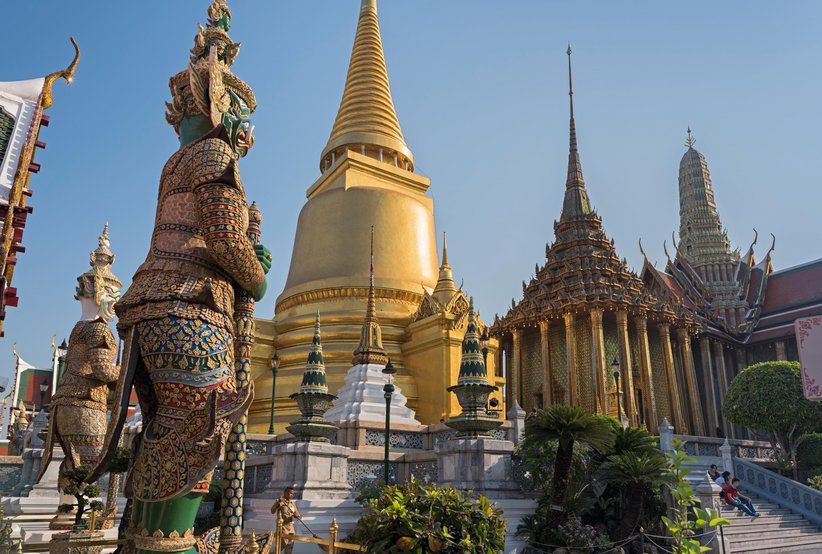Nothing is permanent, so everything is precious. Here’s a selection of some happenings—fleeting or otherwise—in the Buddhist world this week.
Thailand Reopens Bangkok Attractions; Loosens Travel Restrictions
On October 27, Thailand’s Royal Household Bureau announced that Bangkok’s Grand Palace and Temple of the Emerald Buddha, which is on the grounds of the Grand Palace, will reopen on November 1 after being closed due to the COVID-19 pandemic. New safety requirements include mandatory face masks, temperature checks, and contact tracing. The reopening coincides with the Thai government’s loosening on travel restrictions to allow and encourage more vaccinated tourists to visit the country. While this may help stimulate the Thai economy, which has been struggling due to the pandemic and the resulting decline in tourism (a sector that accounted for 21 percent of the country’s GDP in 2019), only 42 percent of the Thai population has been fully vaccinated against the virus, according to Our World in Data.
Tibetans Will Speak at United Nations Climate Conference, COP26, Which Starts Sunday
A group of Tibetan panelists will speak about the role of the Tibetan Plateau in the global climate system at the upcoming two-week United Nations Climate Conference, COP26, which starts Sunday in Glasgow, UK. Panelists from the advocacy group International Campaign for Tibet (ICT) plan to inform policymakers about the importance of the plateau—including its global impact on jet streams, monsoon dynamics, and the northern hemisphere’s water cycle—and why Tibet needs to be part of the global climate conversation. Two talks on Tibet will take place during the conference. The first talk, titled “Tibet’s Climate Crisis: Critical Lessons for Global Climate Policy,” will be held on November 4th, and panelists will highlight the lessons Tibet offers for designing inclusive and sustainable global climate policies. During the second talk on November 7th, titled “The Climate Catastrophe the World Ignores: The Tibet Climate Crisis and Chinese Colonialism,” panelists will discuss how China’s occupation of Tibet is exacerbating the effects of climate change on the plateau.
Ahead of COP26, His Holiness the Dalai Lama issued a video message on October 29 urging leaders to pay greater attention to preserving Tibetan ecology. “At least in Asia, Tibet is the ultimate source of water,” he said, referring to the plateau’s importance as the third-largest reservoir of freshwater on Earth. “This is not only in the interest of 6–7 million Tibetans but [all] people in the area.”
Hate-Mongering Monk Appointed to Lead Sri Lanken Task Force on Legal Reforms
Sri Lanken President Gotabaya Rajapaksa has appointed Galagodaatte Gnanasara, a controversial monk who has been accused of inciting anti-muslim violence, to a new legal task force meant to prepare a proposal for the “One Country, One Law” platform Rajapaksa ran on in 2019. The platform appealed to the Sinhala Buddhist majority as a way to counter Islamic extremism, especially after the April 2019 suicide attack linked to the extremist Islamic group National Thawheed Jamaat (NTJ). But minorities remain skeptical that the campaign will represent everyone equally. The task force includes four Muslims, but none from the Tamil ethnic minority, and no women, and the decision to include Gnanasara has drawn significant criticism. Opposition Tamil lawmaker Shanakiyan Rasamanickam wrote on Twitter, “The appointment of a criminal to lead this committee is almost a joke in itself.”
San Francisco Zen Center Releases “Suzuki Roshi Audio Archive”
San Francisco Zen Center has released a new audio archive of Zen master Suzuki Roshi’s teachings. Suzuki Roshi was the dharma center’s founding teacher and is credited with popularizing Zen in the West. The new collection includes over 300 audio recordings that have been restored and remastered for superior sound quality. Full transcripts accompany the recordings, which can be searched for according to keywords and dates. San Francisco Zen Center has also launched a series called Awakening the Archive, a year-long project that will release one unheard Suzuki recording every two weeks via SFZC’s Sangha News Journal. Zen priest and teacher Shundo David Haye, who was involved with the restoration work, will write an accompanying article providing context for each new talk. Explore the archive here and look out for the previously unreleased talks, four of which are already up, here.
Thank you for subscribing to Tricycle! As a nonprofit, we depend on readers like you to keep Buddhist teachings and practices widely available.
